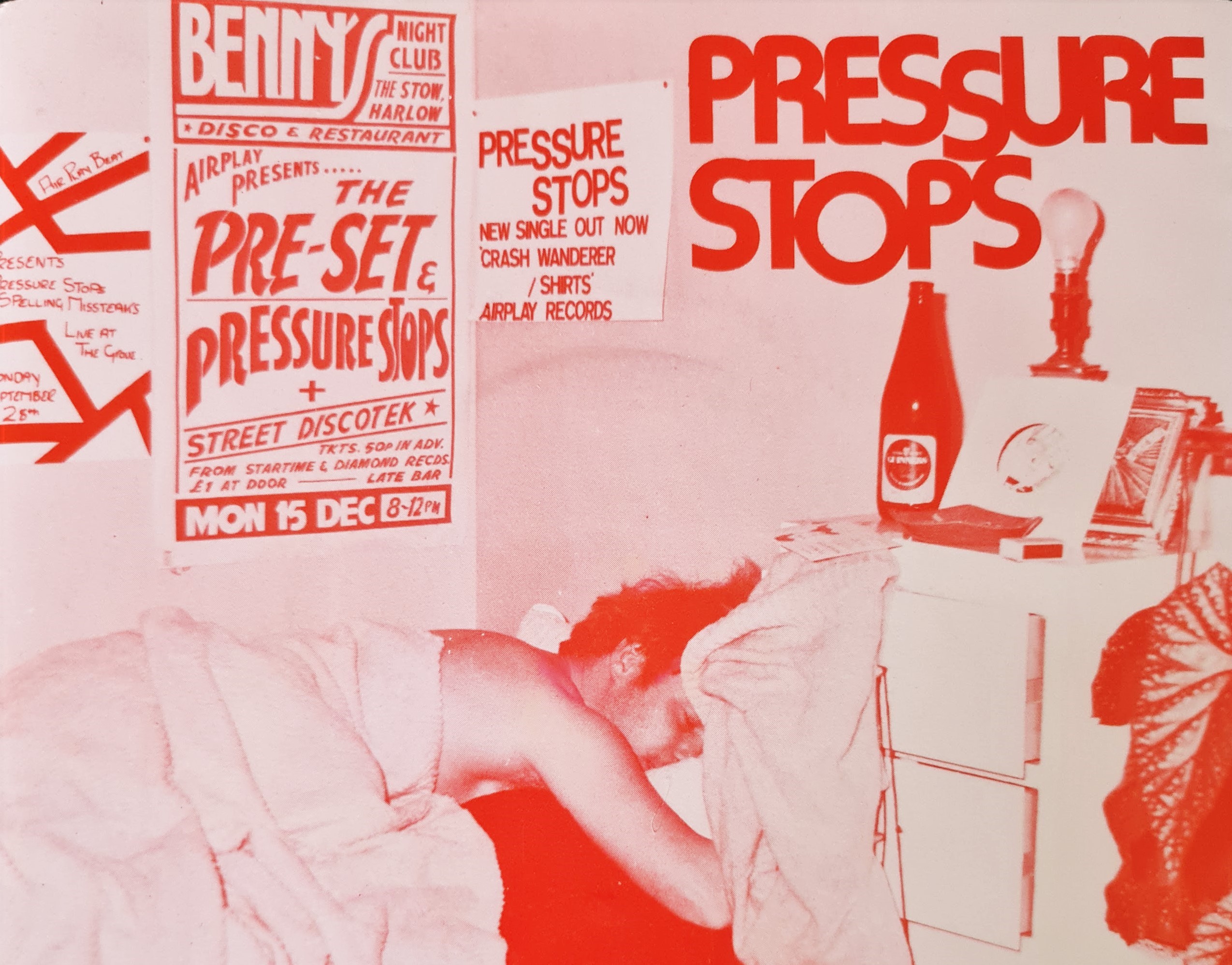Punk music began to develop quickly in the UK, much to the frustration of a disaffected establishment, hell-bent on shutting down the problem at source.
(Click here for previous blogs)
Pressure Punk Comes To Harlow
During 1976 an explosion occurred in central London which, albeit small at the time, caused ripples and reverberations that eventually made their way to Harlow in Essex, into the house I lived in at The Downs, up the stairs and into the bedroom I shared with my elder brother Robert.

Robert, Carolyn and Me. It’s possible Carolyn didn’t share my enthusiasm for driving. (Harlow Fair – ’63)
On this occasion, the explosion wasn’t the IRA, who had been targeting mainland Britain for a number of years, this time the explosion was of the musical variety and became widely known as Punk Rock. Or just Punk. It was a form of music that paved the way for bands like The Pressure Stops to come into existence. Clearly there was a downside then.
IRA Bombers return to London’s West End

The house in The Downs where an idea to form a punk band began to germinate
Punk wasn’t just about music, it was an attitude, it was fashion, anger, aggression; it was about making dreams seem accessible. It reflected the attitudes of a disaffected youth and its ethos of “Do It Yourself” was the catalyst for another musical form “Indie” to come into existence from the ashes of Punk and New Wave.
Disclaimer
And this is why I like to inform my children at every possible opportunity, that The Pressure Stops invented Indie. I should point out that The Pressure Stops didn’t officially ‘invent’ anything, least of all a whole musical sub-genre. But we were there, at the vanguard of the movement that did. Ok, so not at the vanguard exactly, but off to the side a bit, or near the back, choking in the dust thrown up by others more competent than us.
Four Horsemen

The Four Horsemen of the Apocalypse. The Sex Pistols came to overthrow a 1000 year-old entitled, elitist establishment with nothing more than a handful of 3 minute pop songs and a couple of ripped T-shirts
People On The Side
And herein lies the truth about my dubious claim to fame. We weren’t the bastions of youth culture: we weren’t the leaders of a revolution: we weren’t breaking down the barricades. We were the People On The Side; the outliers, the watchers from the window, bystanders, looking on as others garnered fame, took the plaudits, accepted the accolades and then proceeded to sell their souls to corporate record companies, to High Street clothes shops and to anyone that was willing to stump up a few quid.
Woof
So, although The Sex Pistols, The Clash et al were making a little ‘filthy lucre’ from record deals, they were also being moulded into complicit playthings, being trained, with the offer of the occasional cheque and promissory note from the record company.

I wanna be your dog!
But would I have done the same, given the opportunity? Abso-fucking-lutely I would. Now? No way.
DNA
Many young children have a natural, irrational fear of abandonment. And that fear is a critical function of a child’s DNA survival programming i.e. if you fear abandonment you will develop ways to avoid it, ergo you will survive.
But abandonment issues can also lead to an overblown and unhealthy desire for adulation. So, where does a 4-year-old discover examples of adulation in the early 1960’s? One place would be on TV programmes like “Ready Steady, Go!” or what was at the time, the fledgling “Top of the Pops”.
So, in the simplistic terms of a child searching for a form of security, the conclusion he might come to is this:-
Q. How do I survive?
A. By being liked.
Q. How do I become likeable?
A. By being mindful of others feelings.
Q. Anything else?
A. Yes, join a rock band and become famous. 1-2-3-Blam!

The weekend starts here! Peter Noone & Cathy McGowan create an overblown and unhealthy desire for adulation, on Ready, Steady, Go!
Listen To Music
In March ’77, a seismic shift occurred that would change my life forever. It was a watershed moment. There was a period of perceived, uncompromising knowledge, clarity and wisdom, followed by a chaotic maelstrom of confusion, anger and distrust. And it related to punk music and the press.

The most disturbing aspect of Punk was the establishment (here disguised as “the peoples’ paper“) viewed it as a ‘cult’
Pressure Press
We were told by the media to subscribe to the point of view perfectly summarised by Conservative GLC Member Mr Bernard Brook-Partridge when he stated in ’77 that Punk Rock was “nauseating, disgusting and sleazy.” And they were the positive traits. Expanding on this, he stated that most of these bands “would be improved by sudden death.”
The Partridge Family
And The Sex Pistols he concluded, were “the antithesis of humankind.” A bold statement given he’d never met them and had little idea of who they were.
Pressure Pravda
But you have to place this information into the context of the historical time period in which it occurred. At that time, I was a very naïve and impressionable young man and as far as music was concerned, it existed in the microcosm of a few controlled shows on TV, a handful of controlled Radio Stations, or on your record or cassette player at home.

The BBC & ITV – possibly modelled on other media outlets
Teenage Lobotomy
So, if the press stated punk rock was a nauseating cult, who was I to argue? My ability to be a rational, free-thinking individual had slowly been eroded, day by day. And people like Brook-Partridge were able, using subterfuge and deceit, to control how the nation thought, spoke and acted. It had been happening to all of us, for the whole of our lives and we never suspected a thing.
They’re Our Heroes
But if, as a nation, we were still bewildered as to where we stood regarding this “disturbing new cult”, up stepped Bill Grundy to clarify a few aspects of the new music scene and it didn’t take much longer to polarise the masses.
(warning – video contains colourful language)
“I saw the Bill Grundy/Sex Pistols interview live, when it was broadcast, and I was like, ‘Wow, this is something else.'”1
ROY
Oh Alright, Siegfried
So, if you want to find a good example of how Punk Music was received by the mainstream media in the mid 70’s then this interview provides a perfect insight into the dismissive attitude of both towards the other.

The Today Programme issues an unreserved apology (and then sacks Bill Grundy)
A Disturbing Discovery
However, few months later I was listening to the radio one evening when the DJ played a song by a band called The Stranglers, whom I’d heard of but rather assumed, like all punk bands, were just another discordant group of screaming banshee noisemakers who’s very existence would be greatly improved by sudden death. ‘Peaches’, was the song he played, and when I heard the opening riff, played on a Bass guitar, I was shocked. Disturbed even.

The BBC couldn’t decide whether the song Peaches was morally bankrupt or not. So they banned it from TOTP anyway just to be sure.
Three Notes & The Truth
Just three notes and the thud of a Bass Drum, was all it took to dispel all the scaremongering of the press and media who followed their upper-class traditions of eliminating anything that might attempt to wrestle away the control they held over society. In the song, a reggae-type riff appeared, with its sparse, choppy nature and large gaps in the sound, which were highlighted by the snare and the hi-hat opening and closing, making a ‘pea soup’ type of sound.

Jet Black – was he vegan?
Suddenly everything I had read, everything I had seen, everything I thought I understood about the Punk movement evaporated, dismissed as lies and deceit, as soon I heard the intro to Peaches. Its creativity was stunning; it was like music from another planet. Simple, yet complex; it was new, yet had 60’s style keyboards; it had a bright, scratchy guitar cutting through the heavy rhythm set down by the bass and drums, and it had vocals that were melodic and told a story, albeit one of questionable moral virtues.

The Stranglers – invited me into their (nice ‘n’) sleazy world, and I gleefully accepted
Lyrical Morality
But as a 16-year-old I wasn’t aware of the existence of questionable moral virtues and even if I had been, it wouldn’t have mattered. They were lyrics in a song and nothing more. Furthermore, the vocals were not the screaming, vitriolic rubbish I’d been led to believe was the cornerstone of punk. This was a structured song that got into your head and wouldn’t let go. I was converted. The next day I told my elder sister Carolyn. I said, “I heard that song by The Stranglers yesterday. It’s amazing.” She agreed.
I didn’t know it then, but it was exactly what I had been looking for. The first step towards the creation of The Pressure Stops had been taken.
NEXT – PART 3 – BLITZKRIEG BOP
Click here to go back to the blogs page.
